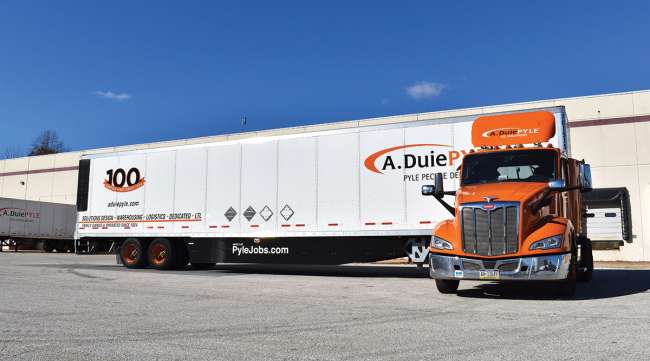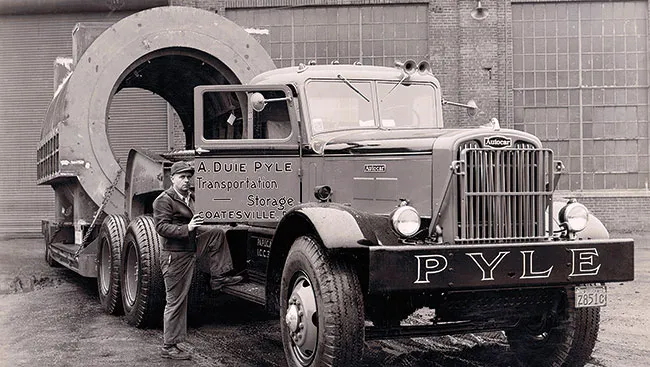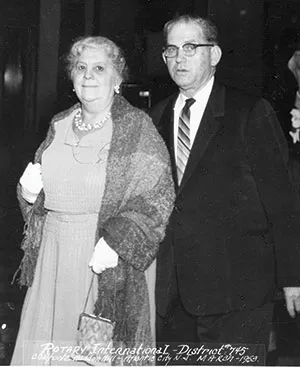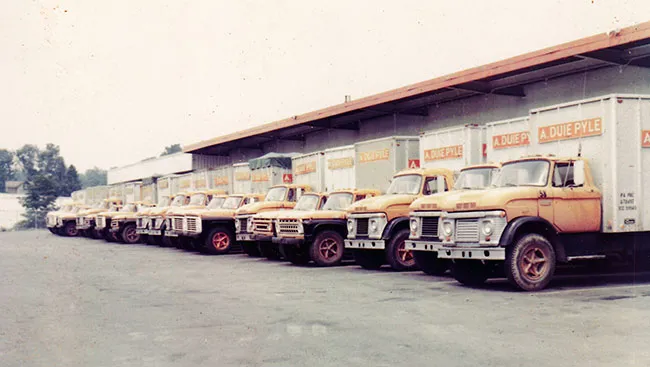Managing Editor, Features and Multimedia
A. Duie Pyle Celebrates Centennial Milestone

[Stay on top of transportation news: Get TTNews in your inbox.]
From the Great Depression to industry deregulation and beyond, A. Duie Pyle has kept trucking through landmark events in U.S. history, a full century of economic cycles and transformational changes in the freight transportation business.
Along the way, the West Chester, Pa.-based motor carrier has grown from a single truck operation into a major less-than-truckload and supply chain services provider with operations throughout the U.S. Northeast.
Earlier this year, A. Duie Pyle joined a select group of American trucking companies that have reached their centennial anniversaries.
The business was founded on April 1, 1924, when Alexander Duie Pyle and his wife, Mary Ellen, purchased a used International Harvester truck and began providing flatbed trailer hauling services for Lukens Steel Co., a local steel manufacturer that remains a customer today.
A century later, the trucking company is still entirely owned by its founding family.
See the 2024 Top 100 rankings
►Freight Recession Squeezing Carriers
►Fleets Persevering in Down Market
►An Immigrant's Journey to Trucking
►A. Duie Pyle's Centennial
►Interactive Map
►Sector Lists Reflect Market Weakness
Sector Rankings
LTL | TL/Dedicated
Intermodal/Drayage
Motor Vehicle/Driveaway
Tank/Bulk | Air/Expedited
Refrigerated | Flatbed/HS
Package/Courier | Mail
Household Goods/Commercial
A. Duie Pyle, which now ranks No. 57 on the Transport Topics Top 100 list of the largest for-hire carriers in North America, generated $775 million in revenue in 2023 and ended the year with 4,300 employees.
While the equipment and technology used in the trucking industry have changed dramatically during the course of the past century, freight transportation has been and will remain a people business, said Peter Latta, a third-generation family member and the president and chairman of A. Duie Pyle.
“Much like a hammer and saw are to a carpenter, trucks are the tools of our trade. But at the end of the day, it’s the people and their commitment and extra effort that define how one company’s service compares to another’s,” Latta said.
That people-centric approach has been a common theme throughout Pyle’s history.
Early in its existence, the business survived the Great Depression while maintaining a 20-truck fleet and keeping all of its drivers employed.
Later, Pyle supported the country’s World War II efforts by transporting war materials produced by Lukens Steel in coordination with the U.S. War Department. Those products included materials used in the Manhattan Project, which produced the atomic bomb that ultimately ended the war.
In the 1960s, when the company had expanded to more than 100 trucks, Alexander Duie Pyle handed the reins to his son-in-law, Jim Latta, who continued to grow the business.
A pivotal moment in the company’s history came in 1979, when Pyle endured a 14-week strike by the Teamsters labor union as the business sought contract terms that differed from the National Master Freight Agreement, which Jimmy Hoffa Sr. first brought to bear on the motor carrier industry in 1964.

An A. Duie Pyle driver with his truck in 1948. (A. Duie Pyle)
Eventually, about 30 of the strikers crossed the picket line, petitioned for an election and voted to de-certify from the union.
The company now reflects on those workers’ bravery and their trust in management as setting the tone for the “Pyle people” — the company’s term for its hardworking employees.
Shortly after that watershed moment in the company’s history, industry deregulation in 1980 upended the competitive landscape in trucking and opened the door for carriers such as A. Duie Pyle to expand geographically.
“Deregulation was a calamity for so many companies, so many people in the industry, but it was an opportunity for us that we were able to capitalize on,” Peter Latta said.
Under his leadership, the company has grown from a local business with a single terminal to a regional LTL carrier operating from what will soon be 34 service centers and 17 warehouses throughout the Northeast.
Before deregulation, the company’s approach was to “sell what you can make,” which at that time was limited to overnight service within a 50-mile radius around West Chester.

Company namesake A. Duie Pyle and his wife, Mary Ellen, in a 1958 photo. (A. Duie Pyle)
But as deregulation unfolded, Pyle’s philosophy shifted to “make what you can sell,” which meant expanding geographically and offering the services that the market wanted, Latta said.
The company now provides LTL service to all towns and cities in a 14-state footprint stretching from the Canada-Maine border to the Virginia-North Carolina line and west to include West Virginia and eastern Ohio. That LTL service extends nationally through Pyle’s partnerships with Southeastern Freight Lines, Dayton Freight Lines and Oak Harbor Freight Lines.
At the same time, A. Duie Pyle has added more capabilities beyond its core LTL operations to become a more comprehensive provider of supply chain services.
The company has built a dedicated transportation division with more than 600 drivers, provides warehousing and distribution services and also offers managed full truckload service through its freight brokerage division.
In addition, the company continues to operate its legacy flatbed steel-hauling business, which still serves Alexander Duie Pyle’s first customer when he started the business 100 years ago.
“One of the reasons we’ve been around for 100 years is because we view the challenges as opportunities,” said Frank Granieri, chief operating officer for supply chain solutions at A. Duie Pyle.

A. Duie Pyle trucks lined up at the company’s terminal in 1968. (A. Duie Pyle)
Looking to the future, Granieri said the company will continue to seek ways to adapt to industry trends and broader societal changes, such as the push for environmental sustainability and the nearshoring of manufacturing from Asia to nearby markets.
Through the years, A. Duie Pyle’s “secret sauce” and the primary reason for its survival, growth and profitability has been its company culture, Latta said.
That includes maintaining its core values — chief among them being to treat others as you wish to be treated — and building mutual trust, which in turn inspires people to go above and beyond the baseline level of effort expected of them, he said. “In a service business, that’s a winning formula.”
Want more news? Listen to today's daily briefing below or go here for more info:





